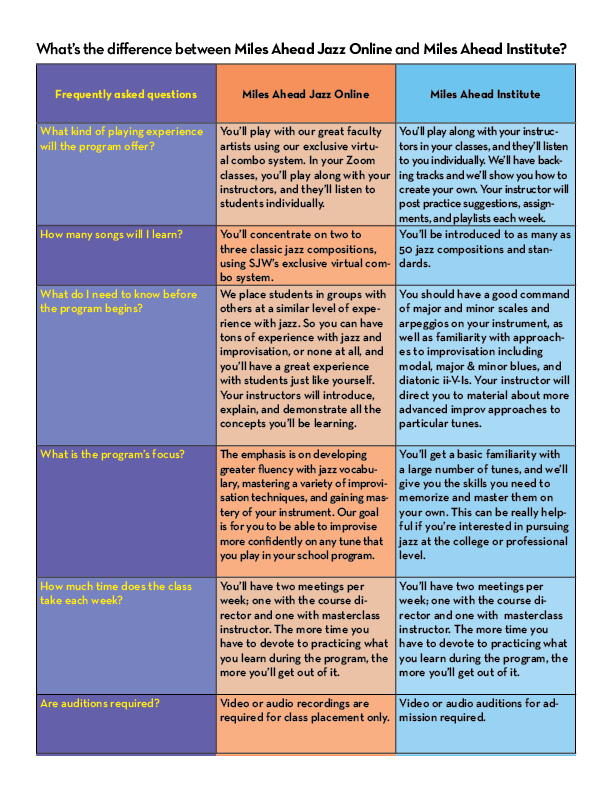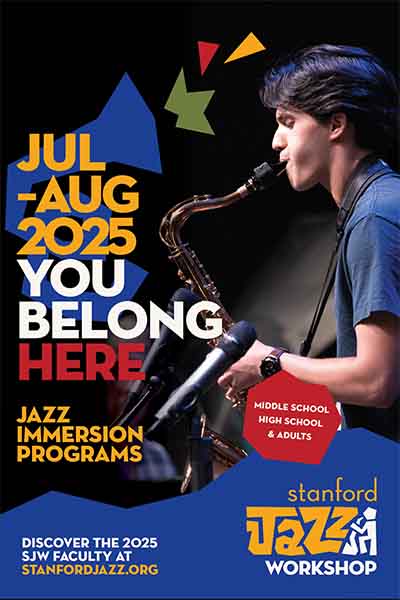By Jim Nadel, Artistic Director and Founder, Stanford Jazz Workshop
Downbeat has its 5 stars, Rotten Tomatoes has its percentages, but my favorite rating system is the SF Chronicle’s Little Man who can be seen in any one of five stages of attention and engagement: from jumping out of his seat while applauding, to the empty chair – presumably because the Little Man has walked out.

Over the decades at Stanford Jazz Festival, I’ve seen it all. Because of the nature of our interactive community where resident artists might hang out for a week and perform in fresh and inspiring combinations, we get more than our fair share of peak performances with the accompanying audience jaw dropping, exhilarated or even ecstatic states. Only once however, do I recall seeing people literally jumping out of their seats in amazement.
Over the course of twenty years at SJW, Ndugu Chancler’s virtuosity was ever present but only ever displayed when in service of the music. When he played with Ruth Davies at SJW’s annual Blues Night, he always gave exactly what the groove needed to feel great, move forward, and inspire the other musicians and the audience. When he performed with Victor Wooten and Geoff Keezer, or Patrice Rushen and Alphonso Johnson, the music grew more open and interactive, and Ndugu played brilliantly in the context of those ever-changing musical conversations.
At the same time, in SJW classrooms or when hanging out at the Coffee House, he was a beloved and inspiring teacher and over the years had a hugely positive influence on hundreds of SJW drummers and thousands of young musicians. Ndugu was from the tough-love school of teaching, and it worked so well for him because it was clear that the underlying love was always there. His honesty and direct, straightforward, no-nonsense nature resonated with young drummers. Combined with his deep musical knowledge, rhythmic wisdom, and excellent communication skills, he was able during his life to give a tremendous amount to a great many people.
Ndugu first came to SJW in the summer of 1997, a year in which we also featured Joe Williams and Louis Bellson, the Ray Brown Trio, Lou Levy, and many other artists. I remember that Charles Brown was the Blues Night guest that year.
A couple of moments from that early time that say it all.
Ndugu was playing drums in a faculty concert for students and community members. While trading fours, he first gave the audience a glimpse of his creative energy and advanced musical consciousness. When he opened up a little, even for just four bars, the music immediately felt elevated.
Later, during a solo drum feature, Ndugu started out simply and wove an engaging musical story that quickly drew people in and then kept them on the edge of their seats. The rhythm grew progressively more thrilling until everyone in the room was lost in the delight of the moment. And at that already joyful moment, it was as if a psychic booster fired and something truly miraculous happened as Ndugu took the entire room to a higher level of ecstacy. It may have been an added layer of polyrhythm coupled with virtuosic control of dynamics, tension, and release, but regardless, the room erupted in amazement with a physical response. Everyone felt it and several people around me involuntarily jumped out of their chairs!
The next day there was a lot of talk about this wonderful performance, and word got out that Ndugu had been invited to sit in at the Latin jazz concert scheduled for that evening on hand percussion, not on drum kit. There was a lot of interest in hearing this master of the drum set play hand percussion, and most of the student body showed up that night to check it out.
As the first song began, eyes were on Ndugu even though this night he’d have a more peripheral role. He picked up a cowbell, and I know a lot of people were thinking, “Get ready, because we’re about to hear some incredible cowbell playing like nobody’s ever heard!” As the song got going, Ndugu stood there listening, bell and drum stick ready in hand. He continued listening as the bars went by and the arrangement revealed itself a bit. Finally after about 32 bars, he played one single eighth-note on an upbeat, and that was it. Eight bars later he played it again, another single note. He was adding something to the rhythmic mix, but no more than what he felt would help.
Every note Ndugu ever played was in service of the music. He astonished us regularly with his musicianship, though he never let ego or technique for technique’s sake get in the way. This was who he was, in terms of music education. Observing his musicianship always provided a great lesson for everyone, whether in the classroom or in concert, regardless of whether he was taking the lead or adding subtle support.
Ndugu was an extraordinary man with a great spirit, and he made an immeasurable contribution to SJW. We and the world of music miss him.
Ndugu, thanks for the music!








